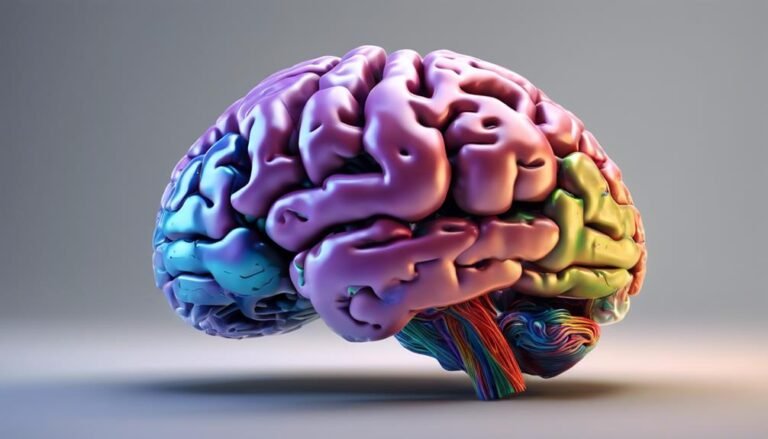Impact of Rollo May on Personality Psychology
You might not be aware that Rollo May's influence on personality psychology extends far beyond his time. His exploration of existential themes and emphasis on personal responsibility have redefined how individual behavior and development are perceived. By delving into the complexities of human existence, May's work offers a unique perspective that continues to shape contemporary discussions in psychology. His concepts of authenticity, freedom, and confronting anxieties provide a rich tapestry for exploring the depths of human personality, inviting you to reconsider your own approach to understanding the self.
Key Takeaways
- Rollo May's emphasis on individual freedom and responsibility influenced modern personality psychology.
- Integration of existential philosophy into psychology enriched the understanding of human behavior.
- May's focus on self-awareness and personal growth aligns with contemporary positive psychology approaches.
- His work highlights the importance of authentic self-exploration and confronting existential anxieties in personality development.
- May's impact on humanistic psychology emphasizes subjective experiences and complexities in understanding personalities.
Early Life and Influences
Growing up in the midst of the Great Depression, Rollo May was profoundly influenced by the economic hardships and social upheavals of the time. His childhood experiences shaped his philosophical influences, leading him to become a prominent figure in existential psychology. May's upbringing during a period of immense financial struggle likely influenced his later focus on the human experience of anxiety, alienation, and the search for meaning.
May's philosophical influences can be traced back to his exposure to existential philosophy, particularly the works of thinkers like Søren Kierkegaard and Friedrich Nietzsche. These early encounters with existential ideas laid the foundation for May's later development of existential psychology, emphasizing individual freedom, responsibility, and the inherent struggles of human existence.
Existential Psychology Foundations
May's exposure to existential philosophy during his formative years laid the groundwork for his development of existential psychology, which emphasizes individual freedom, responsibility, and the inherent struggles of human existence.
Existential therapy, a key aspect of May's work, focuses on helping individuals explore their own self-awareness and confront the anxieties that arise from the challenges of existence. This therapeutic approach encourages individuals to take ownership of their choices and actions, recognizing that they have the power to shape their lives despite the uncertainties and difficulties they may face.
Concept of Dasein
Dasein, a concept central to existential thought, emphasizes authenticity in existence and acknowledges the inevitability of death.
Understanding Being-Towards-Death in Dasein sheds light on how individuals navigate their existence with a heightened awareness of mortality, influencing their choices and values.
May's exploration of Dasein enriches the field of personality psychology by offering insights into the profound impact of existential themes on human experience.
Existential Authenticity in Dasein
Existential authenticity within the concept of Dasein emphasizes the imperative of genuine self-exploration and alignment with one's core values and beliefs. In the context of Dasein, authenticity is rooted in the idea of embracing one's individuality and taking responsibility for shaping one's own existence. This notion aligns with the existential belief in freedom, emphasizing the importance of making authentic choices that resonate with one's true self rather than being swayed by external influences.
Exploration within the framework of Dasein involves delving deep into one's being to uncover hidden motivations, desires, and fears. It requires a willingness to confront the uncertainties and complexities of existence, fostering a deeper understanding of oneself and one's place in the world. Through this process of exploration, individuals can cultivate a sense of authenticity by aligning their actions with their inner truths.
Existential freedom, a central tenet of Dasein, underscores the idea that individuals have the autonomy to shape their own lives and create meaning in a seemingly indifferent world. By embracing this freedom and engaging in genuine self-exploration, individuals can endeavor towards a more authentic existence that's aligned with their deepest values and beliefs.
Being-Towards-Death in Dasein
Authenticity in Dasein extends to the contemplation of one's own mortality, encapsulated in the concept of Being-Towards-Death. This concept, central to Heidegger's philosophy, highlights the inevitability of death as a fundamental aspect of human existence.
Being-Towards-Death in Dasein involves acknowledging the finitude of life, which can evoke existential anxiety as individuals grapple with the realization of their own mortality. This anxiety stems from the awareness that one's existence is finite and that death is an inescapable part of life.
However, embracing Being-Towards-Death can also lead to a profound sense of liberation and authenticity. By accepting the reality of death, individuals are compelled to confront their values, priorities, and choices in life. This confrontation can foster a deeper appreciation for existence and prompt a reevaluation of one's actions and relationships.
Ultimately, the acceptance of death as an intrinsic part of life can empower individuals to live more authentically, aligning their actions with their true selves and finding meaning in the face of mortality.
Anxiety and Authenticity
Anxiety plays a significant role in fostering authenticity, according to Rollo May's perspective.
By facing and maneuvering through their anxieties, individuals can cultivate a deeper connection with their authentic selves.
This process involves embracing the discomfort of anxiety as a pathway towards self-discovery and genuine expression.
Anxiety's Role in Authenticity
An integral aspect of human experience, anxiety plays a significant role in shaping individuals' authentic responses to life's challenges and uncertainties. Anxiety exploration involves delving into the sources of one's fears and worries, understanding how they manifest, and recognizing the impact they've on one's authenticity journey.
Rollo May emphasized that anxiety isn't necessarily a negative force; rather, it can serve as a catalyst for growth and self-discovery. Through confronting anxiety, individuals are pushed to examine their values, beliefs, and motivations more deeply. This introspection fosters a greater understanding of oneself and the world, leading to more authentic interactions and decisions.
Embracing anxiety as a natural part of the human experience allows individuals to navigate their authenticity journey with courage and vulnerability. May believed that by acknowledging and accepting anxiety, individuals can harness its energy to propel them towards a more genuine and fulfilling existence. This perspective highlights the intricate connection between anxiety and authenticity, illustrating how the former can be a powerful tool for self-realization and personal growth.
Cultivating Authentic Self
Cultivating a genuine sense of self involves actively engaging with the complexities of one's emotions and values. Self exploration is an essential aspect of this process, requiring individuals to delve deep into their thoughts and feelings to uncover their authentic identity. Through introspection and reflection, one can gain a better understanding of who they're and what truly matters to them. This journey of self-discovery is often accompanied by moments of anxiety as individuals confront their fears, insecurities, and uncertainties. However, embracing these feelings and using them as catalysts for personal growth can lead to profound transformations.
Personal growth is intricately linked to authenticity, as individuals aim to align their actions with their core beliefs and values. By continuously challenging themselves to step outside their comfort zones and explore their innermost truths, individuals can cultivate a stronger sense of self and live more authentically. This process requires courage, vulnerability, and a willingness to embrace the uncertainties that come with self-discovery.
Ultimately, by engaging in self exploration and pursuing personal growth, individuals can foster a deeper connection with their authentic selves.
Influence on Humanistic Psychology
Rollo May greatly influenced the field of humanistic psychology through his emphasis on existential philosophy and the importance of personal agency in shaping one's own experiences and behaviors. His contributions to humanistic psychology centered around the humanistic approach to therapy, which focuses on an individual's capacity for self-awareness, personal growth, and the realization of one's potential.
May's work aligned with the principles of positive psychology, emphasizing the promotion of well-being and fulfillment by encouraging individuals to explore their inner selves and aim for personal development. In humanistic therapy, May highlighted the significance of self-exploration, introspection, and self-acceptance as pathways to achieving a sense of wholeness and authenticity.
Contemporary Relevance and Critiques
May's influence on humanistic psychology continues to be a subject of contemporary relevance and critique in the field of personality psychology. His emphasis on the importance of existential themes such as freedom, responsibility, and authenticity continues to resonate with contemporary psychologists seeking to understand human behavior within a broader philosophical context.
May's work has been praised for its focus on the individual's subjective experience and the acknowledgment of the complexities of human existence.
However, May's approach has also faced criticism. Some scholars argue that his emphasis on existential concerns may not be universally applicable to all individuals, potentially limiting the generalizability of his theories. Additionally, critics have pointed out that May's work sometimes lacks empirical evidence to support his claims, raising questions about the scientific rigor of his contributions to personality psychology.
Despite these criticisms, May's ideas remain influential in shaping contemporary discussions on the intersection of psychology and philosophy.
Conclusion
To sum up, Rollo May's impact on personality psychology is akin to a guiding lighthouse in the stormy seas of human experience. His existential approach illuminates the path to self-discovery, urging individuals to navigate the waters of freedom and responsibility.
By emphasizing authenticity and confronting anxieties, May's work continues to inspire psychologists to explore deeply into the depths of human consciousness.
His legacy remains a beacon of insight, offering a compass for those seeking to understand the complexities of personality.







